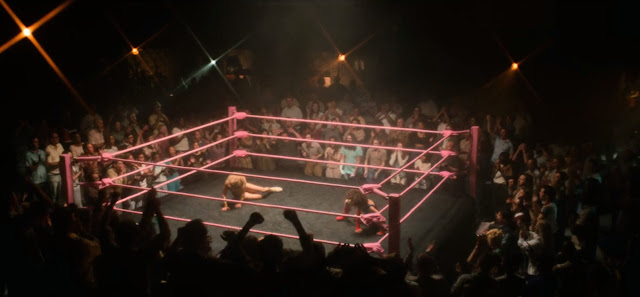"This is totally a soap opera!"

Netflix's new comedy series, GLOW (aka the "Gorgeous Ladies of Wrestling") created by Liz Flahive and Carly Mensch, is a highly entertaining, entirely fictionalized portrayal of the groundbreaking, but often bizarrely surreal, real-life 1980s women's professional wrestling television program—later a subject of its own titular feature documentary that directly inspired the show. Starring Alison Brie, the show is a refreshingly fun, female-driven, period melodrama full of enjoyable camp.
Brie, as the downtrodden Ruth, really gets a lot of opportunities to develop her complex dramatic character. The show manages to make her look and feel ugly and dark despite her natural beauty and charisma on the screen. An out of work actress, she's framed as an energetic and hardworking, but ultimately, tragic figure full of wasted potential and regret looking to redeem herself. She's a human encapsulation of stalled female progress of the time and the ills of Reagan-era social policies.
Co-star Betty Gilpin shines as a struggling single mother, full of powerful vulnerability, looking to redefine her own identity outside of her broken marriage and newborn baby. Comedian Marc Maron is perfectly cast as a cocaine-fuelled, alternate version of himself. His gruff, straightforwardly angry demeanour as a failed artist lends credibility to the altogether zany wrestling production.
Produced by Orange is the New Black creator Jenji Kohan, GLOW has elements of that show's structure grounded by an unconventionally all-female environment made of disparate strangers. The fine ensemble cast is made up of a diverse group of women somewhat forced together by their often downtrodden life circumstances. The issues of female empowerment and themes of self-worth and agency feel more natural due to the organic nature of the story.

GLOW proves itself as a worthy exploration of the beginnings of contemporary culture. The show's characters feature an intriguing ragtag bunch of lost misfits building their own alternative family. Its use of pro wrestling tropes and archetypes provides great current commentary on gender and racial roles in society.
Through 1980s style montages and training sequences set to era-appropriate power ballads, GLOW really distinguishes the art and effort put into professional wrestling. The craft and artistry is splendid as it shows how moves and holds are made to look effortless. It expressly shows how "real" supposed fake (scripted) wrestling is by showcasing the subtext and storytelling of the choreographed sport. Bodies and character personas are used to remix the surface-level themes of American idealism including teamwork and rivalry.
Both silly and smart, GLOW constructs itself as a physical soap opera full of fractured stereotypes and broadly fun portrayals. It wears its cheese on its sleeve and the cast of actresses, real-life wrestlers, and comedians provide an interesting mix of oddball characters sublimely. The finality and lead up to putting on a show is also particularly entertaining for all its period '80s glory.
GLOW is available for streaming now on Netflix.
More | YVArcade / AV Club / Indiewire / The Playlist / Uproxx






